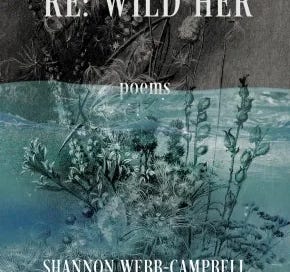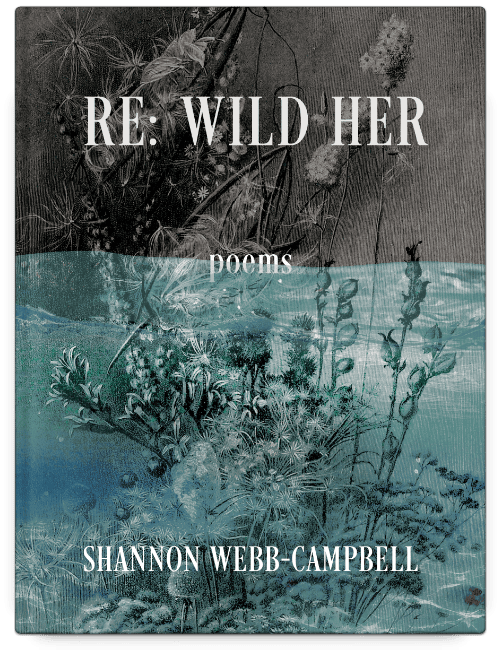In Re: Wild Her, Shannon Webb-Campbell writes as though grief has etched itself into the firmament. Her latest collection is an intimate, itinerant work of lyric poetry that blends the celestial with the sorrowful, the bodily with the political, and the personal with the planetary. With a poet’s ear and a revolutionary’s sense of inheritance, Webb-Campbell charts a poetics of aftermath of what it means to move through love and loss when neither are ever truly finished.
The collection alternates between invocation and confession, roaming across European capitals, late-night bedrooms, and riverside reveries, each poem tethered to histories both colonial and emotional. In one of the collection’s most memorable sequences, the speaker drinks “champagne with the rats / on the steps of the Pantheon / beneath the only star.” It’s a scene that captures the collection’s mood perfectly: a mingling of high and low, sacred and profane, romanticism drenched in the grit of real life. Webb-Campbell’s vision is intoxicated and lucid at once—blood-buzzed, half in love with ruin, yet careful not to glamorize it.
“Webb-Campbell threads astronomy into intimacy, folding the metaphysical into queer desire. These poems suggest that to love, especially as a queer woman, is to court combustion, to risk orbiting another’s gravity until you either collapse or blaze.”
The “stardust woman” who appears midway through the collection functions like a mythic counterpoint to this earthly struggle. Described as “Scorpion to the bone,” this femme figure is not merely muse but cosmic co-conspirator—“a femme made of cooling gases from stars.” Here, Webb-Campbell threads astronomy into intimacy, folding the metaphysical into queer desire. These poems suggest that to love, especially as a queer woman, is to court combustion, to risk orbiting another’s gravity until you either collapse or blaze.
Throughout, Webb-Campbell writes in clipped stanzas and often without punctuation, allowing the language to float, drift, collide. Her syntax mimics the experience of late-night longing and elliptical thought—what it feels like to be “wait[ing] up for a hundred years / to see the lovers wake and reunite.” This line, referencing the entombed star-crossed lovers of Paris, becomes a refrain of sorts, echoing the collection’s core concern: how do we live with absence, and what rituals—poetry, pilgrimage, intoxication—might bring us closer to something like solace?
Even in its most intimate moments, Re:Wild Her keeps its feet on the ground. Its queerness is complex, its grief never neatly resolved. Rather than epiphany, the poems prefer the slow burn of processing, remembering, surviving. At times, this means the collection can feel diffuse—more constellation than arc. But this, too, seems intentional. Webb-Campbell isn't offering narrative closure; she’s giving us shards, fragments, flares of insight that are to be read in orbit with one another.
Shannon Webb-Campbell is of Mi’kmaq and settler heritage and lives in Halifax, Nova Scotia. She is a member of Flat Bay First Nation in Newfoundland and Labrador. Her previous books include Lunar Tides, I Am a Body of Land, and Still No Word, which received Egale Canada’s Out in Print Award. Her forthcoming book, Re: Wild Her, is a form of Indigenous resurgence and pleasure through “poem spells” and offers a different prism with which to rewild ourselves. Shannon holds a PhD from the University of New Brunswick in English-Creative Writing and is the editor of Visual Arts News Magazine and Muskrat Magazine.
Book Details
Publisher: Book*hug Press
Language: English
Paperback: 112 pages
ISBN-13: 978-1771669337






